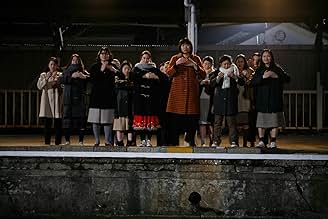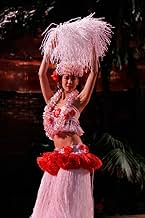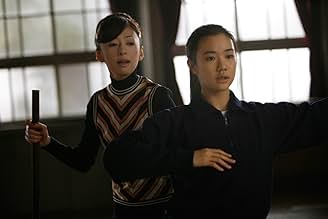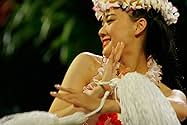IMDb RATING
7.0/10
2.3K
YOUR RATING
Young women in a small Japanese town look to revive their home's declining fortunes by building a Hawaiian village tourist attraction.Young women in a small Japanese town look to revive their home's declining fortunes by building a Hawaiian village tourist attraction.Young women in a small Japanese town look to revive their home's declining fortunes by building a Hawaiian village tourist attraction.
- Awards
- 23 wins & 8 nominations total
Hiroki Miyake
- Mitsuo Inokari
- (as Kojo Miyake)
Hiroshi Ôkôchi
- Coal Miners' Union Offical
- (as Hiroshi Ohkôchi)
- Director
- Writers
- All cast & crew
- Production, box office & more at IMDbPro
Featured reviews
I saw 'Hula Girl' at the Toronto International Film Festival with the affable director Lee Sang-Il present.
This movie, based on the true story of how a dying coal mining town attempts the preposterous idea of building a taste of Hawaii in the cold town through dancing girls, a huge palm-tree filled centre and an 'outsider' dance teacher from Tokyo.
Almost immediately, you know that this movie will be about the town's struggle to survive pitting the traditional, town-encrusted family against those supporting a potential new way of life. I had thoughts of the Japanese version of 'Shall We Dance' ringing through my mind, but perhaps the dancing is the furthest you can compare between the movies. The emotional depth of the movie was somewhat unexpected...sadness, some corniness, some laughter. Yet the movie worked where it needed to, and kept moving at the right pace leaving me at the end feeling like I had seen everything that had happened. Except that at the end, I had been so entranced with the characters I was wondering how they, themselves turned out.
The movie pulled me in nicely with a strong story that was well developed and a really good watch.
If you're looking for something a little different, and open to learning a little bit about life in a small Japanese town in the 1960s, I think this gives you a good feel for the people, the attitudes, and a change that took grip in a dramatic and light-hearted way.
Kudos to the director and production team!
This movie, based on the true story of how a dying coal mining town attempts the preposterous idea of building a taste of Hawaii in the cold town through dancing girls, a huge palm-tree filled centre and an 'outsider' dance teacher from Tokyo.
Almost immediately, you know that this movie will be about the town's struggle to survive pitting the traditional, town-encrusted family against those supporting a potential new way of life. I had thoughts of the Japanese version of 'Shall We Dance' ringing through my mind, but perhaps the dancing is the furthest you can compare between the movies. The emotional depth of the movie was somewhat unexpected...sadness, some corniness, some laughter. Yet the movie worked where it needed to, and kept moving at the right pace leaving me at the end feeling like I had seen everything that had happened. Except that at the end, I had been so entranced with the characters I was wondering how they, themselves turned out.
The movie pulled me in nicely with a strong story that was well developed and a really good watch.
If you're looking for something a little different, and open to learning a little bit about life in a small Japanese town in the 1960s, I think this gives you a good feel for the people, the attitudes, and a change that took grip in a dramatic and light-hearted way.
Kudos to the director and production team!
This film was quite dramatic. There were some very emotional scenes. I often cried. The dance scenes were simple (subtle) and quite appropriate. We get a realistic glimpse into the Japanese homes, the workplace and the local eating place, as well as some Japanese customs (particularly the sumimasen), in this small 1960's Japanese town.
A Hula Dance teacher is brought to a small mining town to teach Hula to the young girls in hopes that the town will create a Hawaiian tourist attraction in the near future. The young girls are presented with an opportunity to change their fate (and unknowingly, the fate of their town). The majority of the townsfolk are in complete opposition, putting the young girls at serious odds with their families and the society in which the live.
This story is loaded with dramatic personal interactions between characters. Many of the characters are developing (people becoming better persons). The sensei undergoes a bit of an attitude adjustment, inspired by her dancers. However, it is not until a climactic Hula Show that we realize the true heroine of Hula Girls.
I shall recommend this to all aspiring dancers. This review was based on the Japanese film with English subtitles.
A Hula Dance teacher is brought to a small mining town to teach Hula to the young girls in hopes that the town will create a Hawaiian tourist attraction in the near future. The young girls are presented with an opportunity to change their fate (and unknowingly, the fate of their town). The majority of the townsfolk are in complete opposition, putting the young girls at serious odds with their families and the society in which the live.
This story is loaded with dramatic personal interactions between characters. Many of the characters are developing (people becoming better persons). The sensei undergoes a bit of an attitude adjustment, inspired by her dancers. However, it is not until a climactic Hula Show that we realize the true heroine of Hula Girls.
I shall recommend this to all aspiring dancers. This review was based on the Japanese film with English subtitles.
Comparing to other Japanese dramas that I've ever watched, this film was quite unique. Unlike most other Japanese dramas whose atmospheres are quite refined and reserved, where the characters display their emotions and feelings in moderate and poetic manners that we often regard as a typical Japanese culture, the characters in "Hula girls" are pretty much straight forward in expressing their emotions and rather rough in manners. It reminded me of the atmosphere of old Sicilian village where Toto of "Cinema Paradiso" had spent his boyhood, where people are rough and tough in manners and sometimes even vulgar but still warm-hearted and have good humanity.
"Hula girls" is a heart-warming human drama. It will warm your heart in a little different manners from other typical Japanese human dramas. It makes audiences sometimes laugh and sometimes shed tears. It will make a wonderful family movie. Especially, I loved the last hula dancing scene where all the emotions, the joy, the sadness, the struggle and the overcoming are melted down and sublimated into a beautiful performance. It was really beautiful and touching.
"Hula girls" is a heart-warming human drama. It will warm your heart in a little different manners from other typical Japanese human dramas. It makes audiences sometimes laugh and sometimes shed tears. It will make a wonderful family movie. Especially, I loved the last hula dancing scene where all the emotions, the joy, the sadness, the struggle and the overcoming are melted down and sublimated into a beautiful performance. It was really beautiful and touching.
This is one of my favorite movie. It contains nice relationships among people in country side, a little bit comedy yet heart warming.
Girls living in Hukushima prefecture including Kumiko, played by Yu Aoi decided to work as a dancer to save people's live there. Those days around Showa40 year, their life style was going to be changed, and it meant people in Kumiko's village were going to lose their work. Instead of that, they try to built a big entertainer, "Resort Hawaiians". That's why they try hard to be a fine dancers to work there as "Hula girls"!! However, it's not easy to manage it through some problems. Villager are used to work as coal miner, even through they have some dead in mine, and also it's hard for Kumiko and her mates to master Hula which they had not know at all. Can they dance? Can they save people? What's become of them? I believe you can enjoy not only story, but also one of Japanese dialects.This is what I, Japanese student says, so you can be sure to enjoy interesting Japanese. It obviously shows Japanese dialect! Do not miss it!
Girls living in Hukushima prefecture including Kumiko, played by Yu Aoi decided to work as a dancer to save people's live there. Those days around Showa40 year, their life style was going to be changed, and it meant people in Kumiko's village were going to lose their work. Instead of that, they try to built a big entertainer, "Resort Hawaiians". That's why they try hard to be a fine dancers to work there as "Hula girls"!! However, it's not easy to manage it through some problems. Villager are used to work as coal miner, even through they have some dead in mine, and also it's hard for Kumiko and her mates to master Hula which they had not know at all. Can they dance? Can they save people? What's become of them? I believe you can enjoy not only story, but also one of Japanese dialects.This is what I, Japanese student says, so you can be sure to enjoy interesting Japanese. It obviously shows Japanese dialect! Do not miss it!
Between 1966 and 1970 I was stationed at Misawa AFB in Aomori Prefecture, Japan. I had a car and traveled a lot. Eventually went to the Joban Hawaiian Center at the suggestion of a Japanese friend and fell in love with the place. I made the JHC my main spot for R&R after that and even scheduled several trips there for my coworkers.
This movie is NOT a comedy, in my mind, but a true life story about overcoming tragedy. I went to the JHC very often and the dancers and staff got to know me well. Between performances I often drank coke with the Hula dancers and on one visit I was asked to help a male-female duet with the pronunciation of the words for "The Hawaiian Wedding Song". I watch this movie every chance I get and it always brings tears to my eyes. The Joban Hawaiian center is one of the reasons I eventually spent 30 years teaching English in Japan (returned to the U.S. in Feb. 2014).
This movie is NOT a comedy, in my mind, but a true life story about overcoming tragedy. I went to the JHC very often and the dancers and staff got to know me well. Between performances I often drank coke with the Hula dancers and on one visit I was asked to help a male-female duet with the pronunciation of the words for "The Hawaiian Wedding Song". I watch this movie every chance I get and it always brings tears to my eyes. The Joban Hawaiian center is one of the reasons I eventually spent 30 years teaching English in Japan (returned to the U.S. in Feb. 2014).
Did you know
- TriviaNone of the actresses had any dance training prior to the film, so they trained for three months.
Details
- Release date
- Country of origin
- Official sites
- Language
- Also known as
- 扶桑花女孩
- Filming locations
- Production companies
- See more company credits at IMDbPro
Box office
- Gross worldwide
- $9,483,095
- Runtime
- 1h 48m(108 min)
- Color
- Sound mix
- Aspect ratio
- 1.85 : 1
Contribute to this page
Suggest an edit or add missing content


























